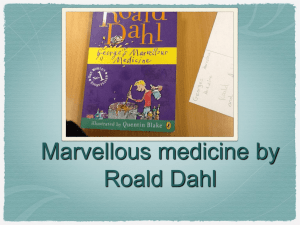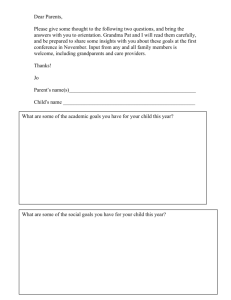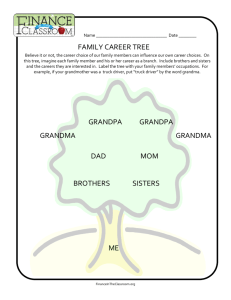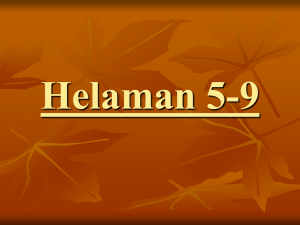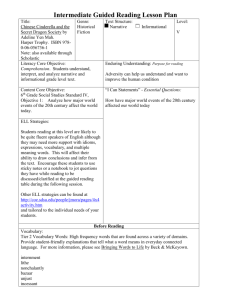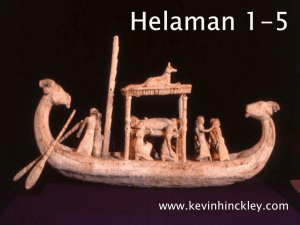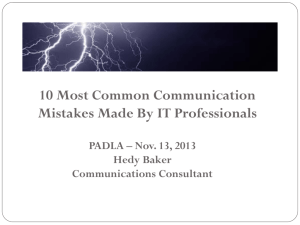Helaman 1-5 - BR's home page
advertisement
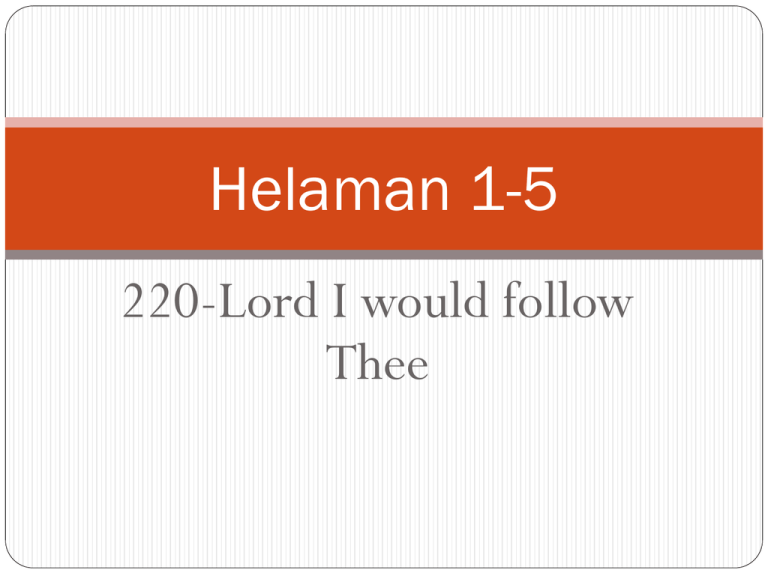
Helaman 1-5 220-Lord I would follow Thee Helaman 1:1-15, 18, 21 Three brothers CONTEND for the judgment seat in this story. What happens to all three brothers within a short amount of time? In other words, CONTENTION KILLS! How and what does contention kill in our relationships with roommates, spouse, parents, friends? President James E. Faust of the First Presidency stated “When there is contention, the Spirit of the Lord will depart, regardless of who is at fault” (in Conference Report, Apr. 1996, 57; or Ensign, May 1996, 41). Helaman 1:11; 2:3-4, 13-14 After reading the following quotation, ask yourself “In what other forms can I see secret combinations developing today and what should I be doing about it?” “The Book of Mormon teaches that secret combinations engaged in crime present a serious challenge, not just to individuals and families but to entire civilizations. Among today’s secret combinations are gangs, drug cartels, and organized crime families. The secret combinations of our day function much like the Gadianton robbers of the Book of Mormon times. They have secret signs and code words. They participate in secret rites and initiation ceremonies... “If we are not careful, today’s secret combinations can obtain power and influence just as quickly and just as completely as they did in Book of Mormon times. Do you remember the pattern? The secret combinations began among the ‘more wicked part’ of society, but eventually ‘seduced the more part of the righteous’ until the whole society was polluted [Helaman 6:38]. . . [Satan’s] purpose is to destroy individuals, families, communities, and nations [see 2 Nephi 9:9]. To a degree, he was successful during Book of Mormon times. And he is having far too much success today. That’s why it is so important for us as priesthood holders to take a firm stand for truth and right by doing what we can to help keep our communities safe” (in Conference Report, Oct. 1997, 51–52; or Ensign, Nov. 1997, 38). Helaman 3:26-30 What happened in these verses because people laid “hold upon the word of God?” What blessings (see quotation below) could you hope for by laying “hold upon the word of God” more firmly? “Success in righteousness, the power to avoid deception and resist temptation, guidance in our daily lives, healing of the soul—these are but a few of the promises the Lord has given to those who will come to His word….However diligent we may be in other areas, certain blessings are to be found only in the scriptures, only in coming to the word of the Lord and holding fast to it as we make our way through the mists of darkness to the tree of life” (Ezra Taft Benson, “The Power of the Word,” Ensign, May 1986, 82). Helaman 3:33-34; 4:11-13, 24-25 The Nephites lost over half their lands and God’s protection in this scripture account because of pride. What are some of the things you have lost because of pride? What might you be in jeopardy of losing because of pride? “Think of what pride has cost us in the past and what it is now costing us in our own lives, our families, and the Church. “Think of the repentance that could take place with lives changed, marriages preserved, and homes strengthened, if pride did not keep us from confessing our sins and forsaking them (see D&C 58:43). “Think of the many who are less-active members of the Church because they were offended and their pride will not allow them to forgive or fully sup at the Lord’s table. “Think of the tens of thousands of young men and couples who could be on missions except for the pride that keeps them from yielding their hearts unto God (see Alma 10:6; Helaman 3:34–35). “Think how temple work would increase if the time spent in this godly service were more important than the many prideful pursuits that compete for our time” (Ezra Taft Benson, in Conference Report, Apr. 1989, 6; or Ensign, May 1989, 6). I read a tender story written by Louise Dickinson Rich which vividly illustrates this truth. She wrote: “My grandmother had an enemy named Mrs. Wilcox. Grandma and Mrs. Wilcox moved, as brides, into next-door houses on the main street of the tiny town in which they were to live out their lives. I don’t know what started the war between them—and I don’t think that by the time I came along, over thirty years later, they themselves remembered what started it. This was no polite sparring match; this was total war. … “Nothing in town escaped repercussion. The 300-year-old church, which had lived through the Revolution, the Civil War, and the Spanish-American War, almost went down when Grandma and Mrs. Wilcox fought the Battle of the Ladies’ Aid. Grandma won that engagement, but it was a hollow victory. Mrs. Wilcox, since she couldn’t be president, resigned in a huff. What’s the fun of running a thing if you can’t force your enemy to eat crow? Mrs. Wilcox won the Battle of the Public Library by getting her niece, Gertrude, appointed librarian instead of Aunt Phyllis. The day Gertrude took over was the day Grandma stopped reading library books. They became ‘filthy germy things’ overnight. The Battle of the High School was a draw. The principal got a better job and left before Mrs. Wilcox succeeded in having him ousted or Grandma in having him given life tenure of office. “When as children we visited my grandmother, part of the fun was making faces at Mrs. Wilcox’s grandchildren. One banner day we put a snake into the Wilcox rain barrel. My grandmother made token protests, but we sensed tacit sympathy. “Don’t think for a minute that this was a one-sided campaign. Mrs. Wilcox had grandchildren, too. Grandma didn’t get off scot free. Never a windy washday went by that the clothesline didn’t mysteriously break, with the clothes falling in the dirt. “I don’t know how Grandma could have borne her troubles so long if it hadn’t been for the household page of her daily Boston newspaper. This household page was a wonderful institution. Besides the usual cooking hints and cleaning advice, it had a department composed of letters from readers to each other. The idea was that if you had a problem—or even only some steam to blow off—you wrote a letter to the paper, signing some fancy name like Arbutus. That was Grandma’s pen name. Then some of the other ladies who had the same problem wrote back and told you what they had done about it, signing themselves One Who Knows or Xanthippe or whatever. Very often, the problem disposed of, you kept on for years writing to each other through the column of the paper, telling each other about your children and your canning and your new dining-room suite. That’s what happened to Grandma. She and a woman called Sea Gull corresponded for a quarter of a century. Sea Gull was Grandma’s true friend. “When I was about sixteen, Mrs. Wilcox died. In a small town, no matter how much you have hated your next-door neighbor, it is only common decency to run over and see what practical service you can do the bereaved. Grandma, neat in a percale apron to show that she meant what she said about being put to work, crossed the lawn to the Wilcox house, where the Wilcox daughters set her to cleaning the already-immaculate front parlor for the funeral. And there on the parlor table in the place of honor was a huge scrapbook; and in the scrapbook, pasted neatly in parallel columns were Grandma’s letters to Sea Gull over the years and Sea Gull’s letters to her. Though neither woman had known it, Grandma’s worst enemy had been her [very] best friend. That was the only time I remember seeing my grandmother cry. I didn’t know then exactly what she was crying about, but I do now. She was crying for all the wasted years which could never be salvaged.” Helaman 3:35 How did sanctification come for these people? Ponder how you can “yield [your] heart unto God” , personally, that you might have sanctification. Write about it. “Ultimate consecration is the yielding up of oneself to God….. Such totality involves the submissive converging of feelings, thoughts, words, and deeds” (Neal A. Maxwell, in Conference Report, Apr. 2002, 41; or Ensign, May 2002, 36). Helaman 5:5-14 What word can be found fifteen times in these verses? Please mark it. What is the significance of this word? After you read the quotation, ask yourself “What did Helaman tell his sons to remember? What should I remember?” “When you look in the dictionary for the most important word, do you know what it is? It could be remember. Because all of you have made covenants—you know what to do and you know how to do it— our greatest need is to remember. That is why everyone goes to sacrament meeting every Sabbath day—to take the sacrament and listen to the priests pray that they ‘may always remember him and keep his commandments which he has given them.’ Nobody should ever forget to go to sacrament meeting. Remember is the word. Remember is the program” (Spencer W. Kimball, “Circles of Exaltation” [address to Church Educational System religious educators, June 28, 1968], 5).
